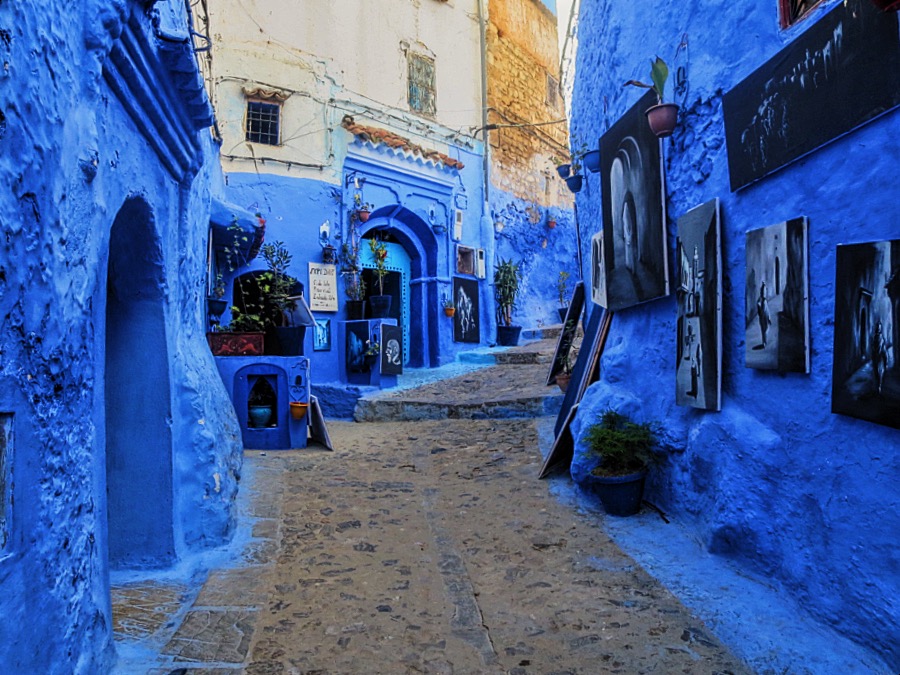Beautifully mosaicked walls, vendors’ stalls bursting with leather goods and pottery of all colors, riding a camel into the desert and sleeping under more stars than you can comprehend… these images surface in the minds of many upon hearing that I studied abroad in Morocco. I was certainly not immune to these fantasies as I boarded my plane last spring. Are these images an accurate depiction of Morocco? Absolutely. You sure can buy just about any artisan craft or modern good imaginable in al-medina al-qadima (the old city) of Fes, and trekking over sand dunes in the Sahara is a surreal experience. However, after exposing myself to as many aspects of Morocco as possible for three months, I have found that the portrayal of this country as an exotic, idealized location over simplifies an extremely complex society and the cultures that lie within.
While this romanticized portrayal of Morocco certainly does no harm to the tourist industry, it has made it possible for American or European tourists to spend a week or two frolicking around the country without learning about its many sides and complexities. Almost daily while I made my way to class, I saw hordes of tourists emerge from the maze of the medina accompanied by a few Moroccan luggage porters, headed straight for the very out-of-place coach bus that would transport them to the next stop on their journey through the enchanting land of Morocco. Maybe they were headed to a ski resort in Ifrane, an ornately restored riad in Meknes or a Bedouin camp in the Sahara. All I knew as I proceeded to flag down one of the petit red taxis that crowd the streets of the Ville Nouvelle (new city), was that their experience certainly did not reflect that of their luggage porter, bus driver or the shop owner down the street.
Living with a Moroccan family in the medina, my experience was very different from that of the tourists who glanced at me curiously as I passed them on narrow streets: a lone, visibly foreign girl who knew her way around the unmapped alleys. My host mother and two sisters shared a single bedroom, and my host brother slept in a little hall that connected the bedroom to the kitchen. I had a small but comfortable room off the living room, yet through the cold nights of winter and hot days of summer, my Moroccan family lives without the heaters, fans and swimming pools that tourists commonly enjoy in their accommodations. The creatures that well-sealed doors and windows prevent from coming inside saw no limits when it came to my host family’s house, most notably (and hauntingly) for me was when I awoke at four in the morning to the outline of a lizard inside my window. As someone with an irrational, yet paralyzing, aversion to such creatures, I hastily ran from the room and waited anxiously for my host family to arise for dawn prayer, impatient yet thankful that they would soon be awake.
Yet the difference between my experience in Morocco and that of a tourist on a quick vacation, extends beyond the comforts of temperature controls and creature-free accommodations. Through endless conversations in Arabic, English and French with my host sisters, I learned about their passion for English, their joys and frustrations with life in Morocco and their interests and goals. Hearing their “insider” perspective immensely deepened my understanding of the society. As someone who has travelled to five continents, I was constantly surprised by the depth of their knowledge of America and the world as a whole despite their only having been as far as Rabat – about two hours from Fes.
I know from experience that conversing and connecting with locals can be extremely challenging, yet considering how much I learned from host family, I would encourage any traveler to step outside of their comfort zone. Use language skills, however minimal they may be, and try to make connections with locals. After all, they can teach you much more about their country in a matter of hours than you can learn in three months. Look beyond the exotic, romanticized image of Morocco that Americans sometimes succumb to regarding developing countries. Learn as much as you can about a country before visiting it. Read about its history, culture and the challenges its people face so that you can gain more than a surface-level view. While those colorfully mosaicked walls are just as beautiful as you imagine, deeper meaning hides behind them.
Photo by Hannah Patzer

